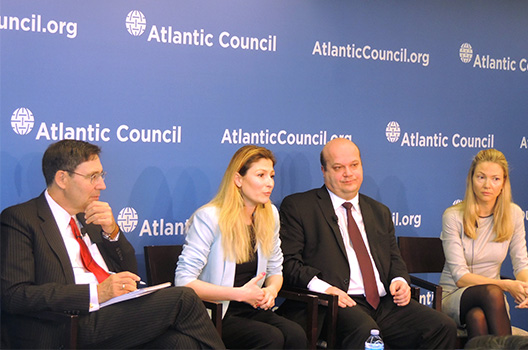 On May 18, 1944, the Soviet Union began the deportation of Crimean Tatars to Central Asia. Decades later, Tatars returned to an independent Ukraine. Since Russia’s illegally attempted annexation of Crimea in 2014, Crimean Tatars have borne the brunt of increasing human rights violations in the peninsula: they face searches, kidnappings, torture, killings, and the authoritarian shut-down of their cultural institutions. Recently, the Russian authorities banned the Mejlis, the Tatars’ legislature.
On May 18, 1944, the Soviet Union began the deportation of Crimean Tatars to Central Asia. Decades later, Tatars returned to an independent Ukraine. Since Russia’s illegally attempted annexation of Crimea in 2014, Crimean Tatars have borne the brunt of increasing human rights violations in the peninsula: they face searches, kidnappings, torture, killings, and the authoritarian shut-down of their cultural institutions. Recently, the Russian authorities banned the Mejlis, the Tatars’ legislature.
On May 16, 2016, the Dinu Patriciu Euraisa Center and the Ukrainian Embassy in the United States hosted a panel discussion on the Crimean Tatars’ plight and how the West should respond to the human rights situation.
The panel comprised Ukrainian Ambassador to the United States, H.E. Valeriy Chaly, Emine Dzheppar, first deputy minister in the Ukrainian Ministry of Information Policy, Ambassador John Herbst, director of the Dinu Patriciu Eurasia Center, and Dr. Agnia Grigas, a senior nonresident fellow in the Dinu Patriciu Eurasia Center.
The panel highlighted the three major issues facing the Crimea and in particular, the Tatar population. Agnia Grigas, who is the author of the new book Beyond Crimea, which examines Kremlin propaganda and a resurgent expansionist Russia, spoke about the Russian dominated narrative of the illegal annexation of Crimea and the subsequent actions taken against Tatars there.
Ambassador Herbst’s opening remarks reminded the audience of the recent banning of the Tatar Mejlis by Russian backed authorities in annexed Crimea. Herbst condemned the lack of response by both Western media and governments, the absence of which demonstrates both “Ukraine fatigue” and highlights Dr. Grigas’ concerns that Kremlin propaganda is dominating the Crimean narrative in the international community.
Ambassador Chaly and Ms. Dzheppar’s remarks outlined the reality of the Russian annexation and subsequent war in Eastern Ukraine. Crucially, Ms. Dzheppar, herself a Crimean Tatar, relayed the weight of cultural memory in shaping the situation for Tatars in Ukraine.
The event was an important discussion of the ongoing human rights abuses against a population whose cultural memory tells them exactly what happens when rights are eroded while the world watches.
